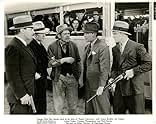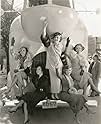Aggiungi una trama nella tua linguaBandleader Jack Conrad is impressed by prison inmate Ray Ferrera on saxophone. Conrad hires Ray to join his band and tour upon his release. Ray hooks up with Jean, a dancer in the show, and ... Leggi tuttoBandleader Jack Conrad is impressed by prison inmate Ray Ferrera on saxophone. Conrad hires Ray to join his band and tour upon his release. Ray hooks up with Jean, a dancer in the show, and the two become a successful dance act. However, when an ex-inmate buddy of Ray's robs the ... Leggi tuttoBandleader Jack Conrad is impressed by prison inmate Ray Ferrera on saxophone. Conrad hires Ray to join his band and tour upon his release. Ray hooks up with Jean, a dancer in the show, and the two become a successful dance act. However, when an ex-inmate buddy of Ray's robs the tour bus, Ray is suspected of wrongdoing by Jack and the others in the group. After a gang... Leggi tutto
- Regia
- Sceneggiatura
- Star
- Patrol Chief
- (non citato nei titoli originali)
- State Trooper
- (non citato nei titoli originali)
- Peanut Vendor
- (non citato nei titoli originali)
- Pianist
- (non citato nei titoli originali)
- 'Schoolboy' Howe
- (non citato nei titoli originali)
- Nurse
- (non citato nei titoli originali)
- Motorcycle Cop
- (non citato nei titoli originali)
- Hotel Clerk
- (non citato nei titoli originali)
- Joe Harris
- (non citato nei titoli originali)
- Musician
- (non citato nei titoli originali)
- Working Girl in Skit
- (non citato nei titoli originali)
Recensioni in evidenza
Looking good thanks to veteran cameraman Harry Fischbeck and slickly edited by Otho Lovering, the proceedings are presided over with unctuous charm by Ben Bernie travelling about the Midwest in an amazing futurist bus. A youthful George Raft in his early song-and-dance man persona makes a surprisingly engaging hero surrounded by a lively cast (many of them uncredited) including both gals and gangsters, with tall, horsey-faced Goodee Montgomery briefly proving to be more than just good with a wisecrack when brought onstage to perform at one point as an eccentric dancer.
Great fun and a neglected find well worth catching!
The film opens with a prison band in concert with band leader Ken Conrad (Ben Bernie) visiting at the invitation of the warden (Robert Emmett O'Conner). It turns out the real reason for the invitation is for the warden to plug the soon-to-be-freed Ray Ferraro (George Raft) as a possible new musician for Conrad's band. The warden's plan works, and Ray has a job with the band on release as a saxophone player. When the band's featured male dancer gets drunk before a show, Ray has that job too. Raft was a very good dancer, and why a double is used for long-shots in the dance scenes I don't know. Ray is, in fact, reformed. He wants nothing more than to make good in his new job, plus he has a new romantic interest in the person of his new dance partner.
Unfortunately, one of Ray's old gang recognizes him during one of their tour stops and proposes the idea that they rob the band of its cash receipts. Ferraro just punches the guy and tells him nothing doing. Thus when the band is robbed a short time later, Ray knows exactly who did it and where to find him. He retrieves the money and punches the guy out, but the real robber escapes just in time for the police to bust in and find Ray alone with the money. The police return Ray and the money to Conrad, who tells the police he believes Ray's story, but in fact he doesn't and neither does the rest of the band, since Ray has never told anyone about the real robber's proposition.
With everyone in the band giving him the brush off, Ray decides to leave the band at the next stop. However, before the bus gets to the next town, they have both a flat tire and the misfortune of running into the outlaw Burrage gang, here headed by a very nasty Lloyd Nolan as Chesty Burrage. The Burrage gang recognize Ray from his criminal days and ask him to join them while they are ransacking the bus and abducting the band. Here Ray has a chance to get even with a group that has wrongly judged him, or he just might save the day - but how, with the gang threatening to shoot Conrad if anyone gets out of line?
Before you get to the gangster part of the film, there is a chance to see some very good and strange entertainment. Bernie is really playing himself as band leader Ken Conrad, and thus you see and hear some traditional big band numbers as well as a strange little skit that is a cross between vaudeville and Hee Haw, with one of the male band members dressed in drag as a lady in distress. Since I don't know much about Ben Bernie's act, I don't know if any of this is close to his real act or not. The music of Gordon and Revel is played throughout the film with the peppy and optimistic little "Let's Spill the Beans" being most prominent.
If you want to be cheered up I can't recommend this film enough to cure what ails you. It's an uncomplicated little tale in which the good guys are really good and the bad guys are awful.
Bernie, the writer of the ubiquitous "Sweet Georgia Brown" (not performed here), plays rather fey band leader Jack Conrad, who hires ex-con Ray Ferraro (George Raft) to play sax on a tour to the West on a jigged up bus matched only the Oscar Meyer Wienermobile (You have to see it to believe it). Knowing the problems his background could cause, Jack changes Ray's name to Ray Angelo. When one of the dancers drinks himself out of a job, Ray fills in there as well and promptly falls for his partner. As this is Raft, there has to be crime along the way -- a robbery in St. Louis, hijacking by the Burrage gang out in the sticks and a great car chase through downtown Omaha.
Even aside from the spectacular bus, there is quirky humor throughout. The band's actual show is very much of the time and highlighted by a number with all the band members in costume for a squirrelly operetta. Raft could really dance - one of his signatures ironically was "Sweet Georgia Brown" - but he does only a few steps here for closeups and the rest of the few dance numbers are done (from a distance) by a double for some reason. The double and Raft do not match in form or style, so it's obvious. Besides Raft the only well known face belongs to a young Lloyd Nolan gleefully playing a very bad man.
Fans of gangster films will enjoy the great Omaha sequence at the end. The style of it is better than anything else in the film. It is as if cinematographer Harry Fischbeck were using this minor comedy to practice for his next "A" crime picture.
Lo sapevi?
- QuizOne of over 700 Paramount productions, filmed between 1929-49, which were sold to MCA/Universal in 1958 for television distribution, and have been owned and controlled by Universal ever since; its earliest documented telecast took place in Seattle Wednesday 12 August 1959 on KIRO (Channel 7).
- Colonne sonoreWOULD THERE BE LOVE?
Music by Harry Revel
Lyrics by Mack Gordon
Performed by Ben Bernie and His Orchestra, vocal Grace Bradley
I più visti
Dettagli
- Data di uscita
- Paese di origine
- Lingua
- Celebre anche come
- One Night Stand
- Luoghi delle riprese
- Azienda produttrice
- Vedi altri crediti dell’azienda su IMDbPro
- Tempo di esecuzione1 ora 20 minuti
- Colore
- Proporzioni
- 1.37 : 1
Contribuisci a questa pagina































